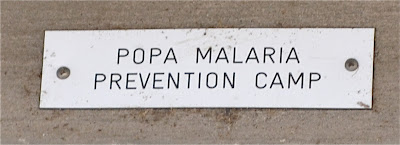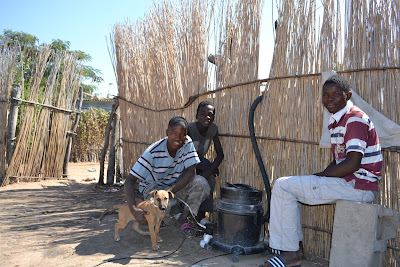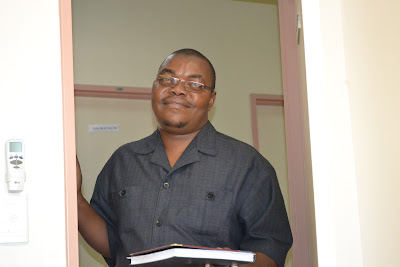On Tuesday, I was feeling lazy after work, so instead of
walking home from my office I grabbed a cab. Every cab here has its own personality. What I noticed first about my cab this
day was that it was immaculate which is hard to pull off in a city with so much
sand and dust. My cab driver
called himself “Under Better” and he was listening to Michael Jackson. I asked
him if he was a big Michael Jackson fan.
He said that he was and that he could sing like Michael Jackson and that
he was saving money to record his own CD, but that his songs would be about
safe driving. He pulled a folder
out from under his dashboard cover (most cars have heavy covers protecting
their dashboards from the relentless sun) and handed it to me. Under Better slowed his car to a crawl
on one of the city’s main roads and watched me (and not the road) as I paged
through his portfolio of photographs.
The pictures were all of himself at various crash scenes and other
scenes of moving vehicle violations.
He explained each image. “This
is a picture of an overloaded boot (they call trunks “boots” here).” “This car has too many people in it” “This
is a car that was involved in an fatal accident. The driver was drunk.” “This is a picture of a man hauling a cooler on a
tricycle with two children riding on top of the cooler.” While he explained all of this to me, he
drove about 10mph and was oblivious to the increasing line of cars piling up
behind us and passing us, and to the ugly looks, shouts, and beeping coming
from each passing car. I looked at
him as he spoke and watched a slow parade of angry faces pass behind him.
Under Better said he wanted to get a dashboard camera and
another camera with a zoom lens so he could capture images from far away. I asked him if he took these photos
while driving. He said “yes” and then
produced a camera from underneath his dashboard cover. As he began telling me about the movie
that he intended to make after his CD was finished, my phone’s text message
alert went off. Under Better began
explaining the plot of his planned movie as I read the message that I received
from my friend Nathan. It read,
“Someone just got attacked by a hippo in a boat. flipped him out.
somehow was able to swim away and now stuck on one of the islands with
hippos surrounding him” My calm
and mature response was,
“WTF? Holy shit. Are you watching this?” Hippos are
extremely dangerous and responsible for more deaths in Africa than any other
animal. They’re big, mean, very
territorial, and fast on land and in water. Nathan lives on a part of the Kavango River that many hippos
also call home.
At about this time I realized that Under Better had taken a
detour and I inquired as to where we were going. He said “just here” and gave no further explanation. He then stopped in front of a house
with a car in the front yard that had been involved in a front-end
collision. He explained that the
driver of this car had died the previous weekend and that he had been
drunk. He said that he wanted
to see the senseless deaths on Namibian roadways stop. As Under Better pulled away from the
crushed car, my phone beeped again.
Nathan had responded “Yeah at the water. They have no idea what to do with the guy.”
Just this past Saturday, I passed the scene of a multi car
accident while running. One car
had rolled many times and both cars were damaged enough to make me wonder if
occupants in one or both were killed.
The crash victims had all been removed, but a crowd of well over 100
remained. The Thursday prior, our
youth center van was involved in an accident and one of our Youth Officers was
also involved in a separate two-car accident that resulted in the death of the
person driving the other car.
Earlier last week, a young girl was struck and killed while walking to
school.
I’d been laughing at Under Better in my head, but then in
dawned on me that he might be onto something. Drivers here (in Rundu at least) are reckless yet seemingly
oblivious to their own recklessness even though they are constantly surrounded
by the consequences of it. I saw
that he wanted to launch a sort of awareness campaign that he would act as the
singing spokesman of. It’s not a
bad idea. I’m not sure if Under
Better is the appropriate man for the job, but he couldn’t have picked a more
appropriate city.
My funeral-precession-pace ride home with Under Better came
to an end just as he reached the exciting climax of his movie description,
where he was being put in jail for having had too many moving violations. Under Better put his turn single on (A
highly underutilized device in Namibia) and carefully pulled to the side of the
road to let me out. I paid him and
wished him luck on his plans and encouraged him to come visit me at the youth
center if he wanted any help. He
seemed confused by my suggestion and reminded me that his name was Under Better
and that if anybody ever introduces himself to me as Under Better that that
person would be him. “If anybody
ever says to you ‘I’m Under Better’, that will be me.” I left it at that.
I continued my text conversation with Nathan. He was with a pack of community members
on the river’s edge. He said he
could hear the man yelling for help, but that any attempt to save him would
have to wait until the morning. It was already dark in a place where hippos own
the night. Taking a boat out
through a pack of them would be suicide. Eventually, Nathan headed home, as
there was nothing he or anybody could do.
The next morning he got word that the man had been rescued, but received
no further details.
Odds and ends;
I’m currently locked in an epic struggle against the
Namibian tendency to be very late to absolutely everything. To address this, I started a
“Punctuality Club” at the Youth Center.
The benefit of being in my Punctuality Club is that members will be able
to join me on tours of local schools where I will give presentations on MCP
(multiple concurrent partnerships), HIV/AIDS, and alcohol abuse. The club members would then do a quick
play (or drama as they call them) to illustrate my message. The youth here really love this sort of
activity and I thought it would be the trick to getting a few to show up on
time. The only club rule is that
you must show up to the weekly meeting on time. Showing up to meetings late (or not at all) is a big problem
here. It’s generally accepted that
no meeting will ever start on time (or even close to on time). I’ve
written entire blog posts sitting in rooms waiting for meetings to begin. It makes planning a full day impossible
and brings productivity to a standstill. My hope for the Punctuality Club was to instill some good
habits in just a handful of Rundu youth and to then release them into the world and
hope that their new respect for punctuality would slowly spread. We had our very first meeting on
Tuesday and not a single person that signed up showed. The adults here are no better about showing
up on time and I believe I may discover a flying pig before I find a punctual Namibian. I’ve decided to accept defeat in
this. There’s a difference between
quitting and knowing when you’re beat.
It’s clear skies every day here. Sometimes there will be a few clouds near sunrise, but they
vanish soon after the sun arrives and you’re left with an enormous dome of blue
throughout each and every day.
It’s winter now. Our mornings and evenings are cool and our days are
warm and short. My highpoint this
week was finding a huge bag of oranges (about 35 in a bag) for N$20 (about
$2.50 US). They’re the best
oranges I’ve had in a long time and as I often lament the lack of fruits and vegetables
here, the past few 5-to-6-orange days have been a nice break. Before coming here, I didn’t fully
appreciate the enormous bouquets of swisschard I used to get at Wegman’s, or
the big bags grapefruit and pears or throw pillow sized bags of frozen
blueberries or jars of hot salsa or big scoop bins full walnuts and raw almonds. I used to buy four big low fat cottage
cheese tubs at a time, one of my training diet staples, but it doesn’t exist
here. Nor do boneless chicken
breast (or boneless anything). A
friend tells me that the lack of enormous chicken breasts here is due to the
fact that Namibians don’t turn their chickens into hormone enhanced steroid
freaks that are unable to bear the weight of their own body on their tiny
chicken legs. That may be true,
but even if “those things can’t even walk”, it doesn’t make me miss them any
less. Thanks for reading.















































